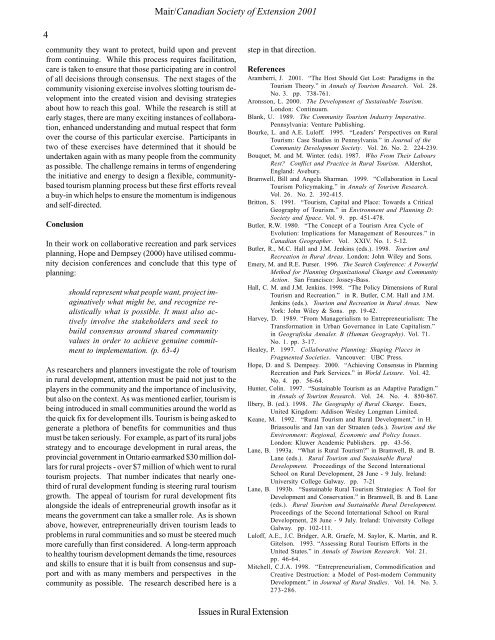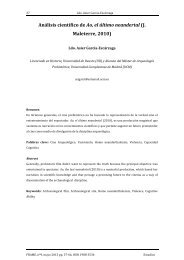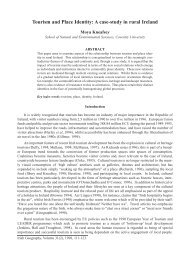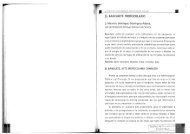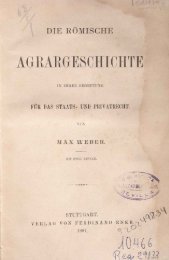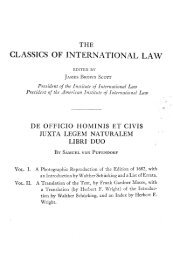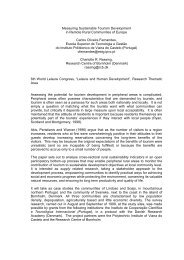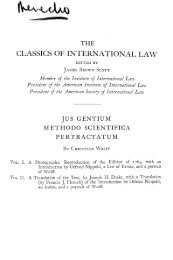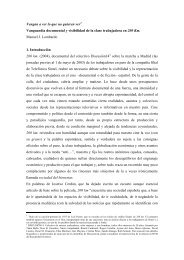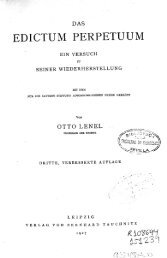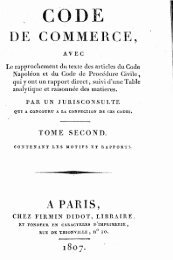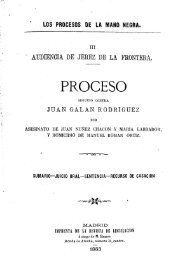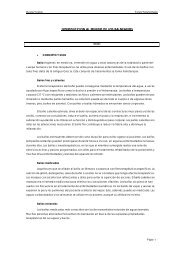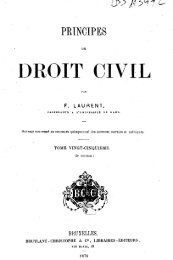Planning for Growth? Re-thinking the Rural Tourism Opportunity1
Planning for Growth? Re-thinking the Rural Tourism Opportunity1
Planning for Growth? Re-thinking the Rural Tourism Opportunity1
Create successful ePaper yourself
Turn your PDF publications into a flip-book with our unique Google optimized e-Paper software.
Mair/Canadian Society of Extension 2001<br />
4<br />
community <strong>the</strong>y want to protect, build upon and prevent<br />
from continuing. While this process requires facilitation,<br />
care is taken to ensure that those participating are in control<br />
of all decisions through consensus. The next stages of <strong>the</strong><br />
community visioning exercise involves slotting tourism development<br />
into <strong>the</strong> created vision and devising strategies<br />
about how to reach this goal. While <strong>the</strong> research is still at<br />
early stages, <strong>the</strong>re are many exciting instances of collaboration,<br />
enhanced understanding and mutual respect that <strong>for</strong>m<br />
over <strong>the</strong> course of this particular exercise. Participants in<br />
two of <strong>the</strong>se exercises have determined that it should be<br />
undertaken again with as many people from <strong>the</strong> community<br />
as possible. The challenge remains in terms of engendering<br />
<strong>the</strong> initiative and energy to design a flexible, communitybased<br />
tourism planning process but <strong>the</strong>se first ef<strong>for</strong>ts reveal<br />
a buy-in which helps to ensure <strong>the</strong> momentum is indigenous<br />
and self-directed.<br />
Conclusion<br />
In <strong>the</strong>ir work on collaborative recreation and park services<br />
planning, Hope and Dempsey (2000) have utilised community<br />
decision conferences and conclude that this type of<br />
planning:<br />
should represent what people want, project imaginatively<br />
what might be, and recognize realistically<br />
what is possible. It must also actively<br />
involve <strong>the</strong> stakeholders and seek to<br />
build consensus around shared community<br />
values in order to achieve genuine commitment<br />
to implementation. (p. 63-4)<br />
As researchers and planners investigate <strong>the</strong> role of tourism<br />
in rural development, attention must be paid not just to <strong>the</strong><br />
players in <strong>the</strong> community and <strong>the</strong> importance of inclusivity,<br />
but also on <strong>the</strong> context. As was mentioned earlier, tourism is<br />
being introduced in small communities around <strong>the</strong> world as<br />
<strong>the</strong> quick fix <strong>for</strong> development ills. <strong>Tourism</strong> is being asked to<br />
generate a plethora of benefits <strong>for</strong> communities and thus<br />
must be taken seriously. For example, as part of its rural jobs<br />
strategy and to encourage development in rural areas, <strong>the</strong><br />
provincial government in Ontario earmarked $30 million dollars<br />
<strong>for</strong> rural projects - over $7 million of which went to rural<br />
tourism projects. That number indicates that nearly onethird<br />
of rural development funding is steering rural tourism<br />
growth. The appeal of tourism <strong>for</strong> rural development fits<br />
alongside <strong>the</strong> ideals of entrepreneurial growth insofar as it<br />
means <strong>the</strong> government can take a smaller role. As is shown<br />
above, however, entrepreneurially driven tourism leads to<br />
problems in rural communities and so must be steered much<br />
more carefully than first considered. A long-term approach<br />
to healthy tourism development demands <strong>the</strong> time, resources<br />
and skills to ensure that it is built from consensus and support<br />
and with as many members and perspectives in <strong>the</strong><br />
community as possible. The research described here is a<br />
step in that direction.<br />
<strong>Re</strong>ferences<br />
Aramberri, J. 2001. “The Host Should Get Lost: Paradigms in <strong>the</strong><br />
<strong>Tourism</strong> Theory.” in Annals of <strong>Tourism</strong> <strong>Re</strong>search. Vol. 28.<br />
No. 3. pp. 738-761.<br />
Aronsson, L. 2000. The Development of Sustainable <strong>Tourism</strong>.<br />
London: Continuum.<br />
Blank, U. 1989. The Community <strong>Tourism</strong> Industry Imperative.<br />
Pennsylvania: Venture Publishing.<br />
Bourke, L. and A.E. Luloff. 1995. “Leaders’ Perspectives on <strong>Rural</strong><br />
<strong>Tourism</strong>: Case Studies in Pennsylvania.” in Journal of <strong>the</strong><br />
Community Development Society. Vol. 26. No. 2. 224-239.<br />
Bouquet, M. and M. Winter. (eds). 1987. Who From Their Labours<br />
<strong>Re</strong>st? Conflict and Practice in <strong>Rural</strong> <strong>Tourism</strong>. Aldershot,<br />
England: Avebury.<br />
Bramwell, Bill and Angela Sharman. 1999. “Collaboration in Local<br />
<strong>Tourism</strong> Policymaking.” in Annals of <strong>Tourism</strong> <strong>Re</strong>search.<br />
Vol. 26. No. 2. 392-415.<br />
Britton, S. 1991. “<strong>Tourism</strong>, Capital and Place: Towards a Critical<br />
Geography of <strong>Tourism</strong>.” in Environment and <strong>Planning</strong> D:<br />
Society and Space. Vol. 9. pp. 451-478.<br />
Butler, R.W. 1980. “The Concept of a <strong>Tourism</strong> Area Cycle of<br />
Evolution: Implications <strong>for</strong> Management of <strong>Re</strong>sources.” in<br />
Canadian Geographer. Vol. XXIV. No. 1. 5-12.<br />
Butler, R., M.C. Hall and J.M. Jenkins (eds.). 1998. <strong>Tourism</strong> and<br />
<strong>Re</strong>creation in <strong>Rural</strong> Areas. London: John Wiley and Sons.<br />
Emery, M. and R.E. Purser. 1996. The Search Conference: A Powerful<br />
Method <strong>for</strong> <strong>Planning</strong> Organizational Change and Community<br />
Action. San Francisco: Jossey-Bass.<br />
Hall, C. M. and J.M. Jenkins. 1998. “The Policy Dimensions of <strong>Rural</strong><br />
<strong>Tourism</strong> and <strong>Re</strong>creation.” in R. Butler, C.M. Hall and J.M.<br />
Jenkins (eds.). <strong>Tourism</strong> and <strong>Re</strong>creation in <strong>Rural</strong> Areas. New<br />
York: John Wiley & Sons. pp. 19-42.<br />
Harvey, D. 1989. “From Managerialism to Entrepreneurialism: The<br />
Trans<strong>for</strong>mation in Urban Governance in Late Capitalism.”<br />
in Geografiska Annaler. B (Human Geography). Vol. 71.<br />
No. 1. pp. 3-17.<br />
Healey, P. 1997. Collaborative <strong>Planning</strong>: Shaping Places in<br />
Fragmented Societies. Vancouver: UBC Press.<br />
Hope, D. and S. Dempsey. 2000. “Achieving Consensus in <strong>Planning</strong><br />
<strong>Re</strong>creation and Park Services.” in World Leisure. Vol. 42.<br />
No. 4. pp. 56-64.<br />
Hunter, Colin. 1997. “Sustainable <strong>Tourism</strong> as an Adaptive Paradigm.”<br />
in Annals of <strong>Tourism</strong> <strong>Re</strong>search. Vol. 24. No. 4. 850-867.<br />
Ilbery, B. (ed.). 1998. The Geography of <strong>Rural</strong> Change. Essex,<br />
United Kingdom: Addison Wesley Longman Limited.<br />
Keane, M. 1992. “<strong>Rural</strong> <strong>Tourism</strong> and <strong>Rural</strong> Development.” in H.<br />
Briassoulis and Jan van der Straaten (eds.). <strong>Tourism</strong> and <strong>the</strong><br />
Environment: <strong>Re</strong>gional, Economic and Policy Issues.<br />
London: Kluwer Academic Publishers. pp. 43-56.<br />
Lane, B. 1993a. “What is <strong>Rural</strong> <strong>Tourism</strong>?” in Bramwell, B. and B.<br />
Lane (eds.). <strong>Rural</strong> <strong>Tourism</strong> and Sustainable <strong>Rural</strong><br />
Development. Proceedings of <strong>the</strong> Second International<br />
School on <strong>Rural</strong> Development, 28 June - 9 July. Ireland:<br />
University College Galway. pp. 7-21<br />
Lane, B. 1993b. “Sustainable <strong>Rural</strong> <strong>Tourism</strong> Strategies: A Tool <strong>for</strong><br />
Development and Conservation.” in Bramwell, B. and B. Lane<br />
(eds.). <strong>Rural</strong> <strong>Tourism</strong> and Sustainable <strong>Rural</strong> Development.<br />
Proceedings of <strong>the</strong> Second International School on <strong>Rural</strong><br />
Development, 28 June - 9 July. Ireland: University College<br />
Galway. pp. 102-111.<br />
Luloff, A.E., J.C. Bridger, A.R. Graefe, M. Saylor, K. Martin, and R.<br />
Gitelson. 1993. “Assessing <strong>Rural</strong> <strong>Tourism</strong> Ef<strong>for</strong>ts in <strong>the</strong><br />
United States.” in Annals of <strong>Tourism</strong> <strong>Re</strong>search. Vol. 21.<br />
pp. 46-64.<br />
Mitchell, C.J.A. 1998. “Entrepreneurialism, Commodification and<br />
Creative Destruction: a Model of Post-modern Community<br />
Development.” in Journal of <strong>Rural</strong> Studies. Vol. 14. No. 3.<br />
273-286.<br />
Issues in <strong>Rural</strong> Extension


